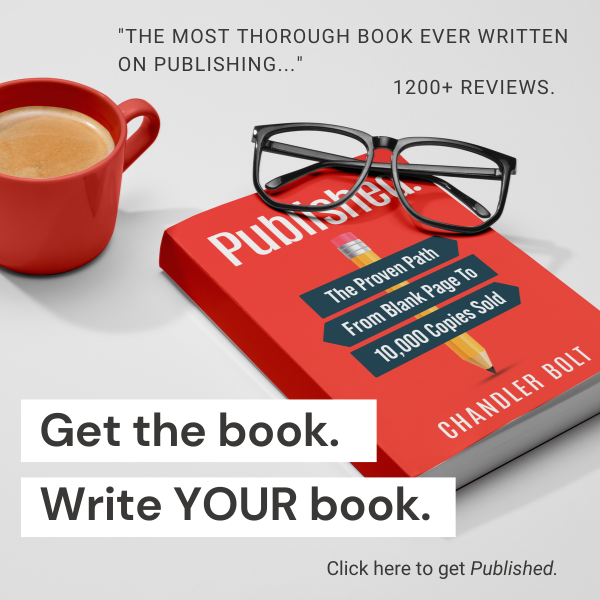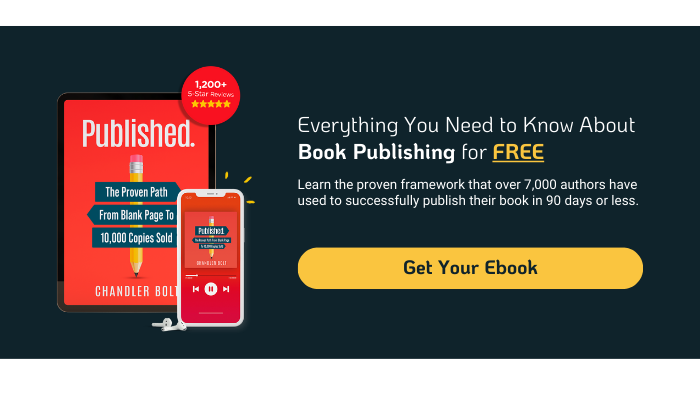It’s crucial to understand all forms of publishing, including hybrid publishing. Why? Millions of new titles are published every year, millions of copies are sold, and new authors join the writing industry left and right.
Researching the general forms writers can use to publish not only helps you decide which method is best for you, but also gives you an inside look at your competition.
If you look around, you likely see writers who choose one of the following three publishing methods:
But what are these methods, and why do they matter? Once you write your book, you want to get it out into the world. Does it really matter how you do so?
The way in which you present your book to future readers matters a great deal because it directly influences your future publishing success. Let’s dive into what I mean, and how you can leverage hybrid publishing for you and your writing career.
Hybrid Publishing: What It Is
Hybrid publishing is a mix between traditional publishing and self-publishing. Unless you know what traditional publishing and self-publishing is, this definition is not very helpful. So, let’s define the following terms:
Traditional publishing is the route writers take when they (more often their agent) pitch their book to an established publisher, receive an offer, and the publisher pays the writer for the privilege of publishing their book.
Self-publishing is when a writer chooses to publish their book without the help (and therefore without the oversight) of a traditional publisher. In self-publishing, the writer takes all the financial risks but also has full control over the process.
Because hybrid publishing is a mix of both of these formats, it is very similar to hiring a contractor to build your author website. You write the copy for the website pages, blogs, and your about section, but the contractor designs the site for you.
While you pay the contractor to create your website, the site is entirely yours and if you decide to use it as a platform to create revenue, all your earnings go into your pocket, not the contractor’s.
Assess If It’s Right For You
With this in mind, it’s time to ask a few pointed questions to help you decide if hybrid publishing is the right option to help you reach your goals. Knowing the pros and cons before starting out will save you time, and likely financial investment, later on.
What Are Your Long Term Publishing Goals?
If you want to become a successful author, there are key points to consider:
- How much are you willing to invest financially in your dream?
- How much time can you put in?
- How detail oriented are you?
- Are you competent in marketing?
Writing and publishing a book is a big commitment. If your goal is to put a book out every year and you have the financial ability to back your dream, hybrid publishing could be for you.
Traditional publishing usually takes quite a bit of time due to the need for agents and accommodating publisher timelines. Consider the following questions:
- Why do I want to publish my book?
- Do I trust myself to market well or do I want a traditional publisher’s help?
- Do I need a big name publisher to back me or does my own name provide enough credibility?
Assess your goals, and then move forward.
What Is Your Author Timeline?
Many writers don’t want to follow the process of traditional publication simply because it can take years. If you want your book to come out in the near future but still hold the look of a professionally published manuscript, check into hybrid publishing.
With hybrid publishers you will likely have the following options:
- You choose your editor
- You choose your editing timeline
- You choose your release date
Rather than wait for an in-house editor to fit you into their busy schedule, you can move forward at your own pace. If time is of the essence, choosing to go the hybrid publishing way may be your best option.
Traditional publishing takes quite a while, and self-publishing can as well if you don’t already know the graphic designers or editors to reach out to. With hybrid publishing, you may be provided with a list of vetted editors who are professional and edit your manuscript according to the publisher’s formatting standards.
How Much Control Do You Want?
If your dream is to strictly write novels for a living, hybrid publishing may not be for you. In traditional publishing, you leave design up to the publisher, and forgo some of your rights and a percentage of your royalties, but get to focus on writing.
However, if you want to take the lead in writing, designing, and marketing your book, hybrid publishing is certainly a choice to consider.
Similarly, with hybrid publishing you can choose your editor.
Editing is a highly subjective field, and matching with the right editor is crucial to the final product of your book. Many editors offer a sample edit on the house (for instance, I often edit the first three pages of a prospective client’s work at no charge).
Hybrid publishing allows you control over:
- Design
- Layout
- Edits
- Timeline
If you’re a writer with a specific vision for your book, hybrid publishing is likely for you.
How Professional Do You Want Your Book To Look?
While any type of publishing can be professional, it’s easy to skimp on designers and editors when publishing entirely on your own.
However, some self-published books did so well that they went on to become a major motion picture. And of course, if you invest in a self-publishing training program you’ll be leaps ahead of other self-published authors.
That said, hybrid publishing allows you the freedom that self-publishing offers, along with the guidance a traditional publisher brings.
Hybrid Publishing: Your Ticket To Your Dream?
Traditional publishing seems like the best option when you strictly consider the aspect that a publisher pays you to publish your book. Self-publishings seems best because you have full control. Hybrid publishing is often the best of both. But all options have their pros and cons.
Before choosing a format and taking off on your publishing journey, do your research, honestly assess your writing goals, and decide how and what you’re willing to invest.
Many people feel they have a book inside them (some even say 81% of Americans feel this way). The question is, what publishing format will best help get your book out of you and into the world?
- Do you need the close guidance and professionalism of a traditional publisher?
- Do you want the freedom of self-publishing your book when you want to and how you want to?
- Or do you want to combine the two: Some guidance countered by some creative freedom?
I can’t make the choice for you—that’s up to you, the writer! And while it may feel overwhelming to decide how you want to publish your book, the good news is, any way you choose to publish is a step in your writing journey.
Don’t let fear hold you back. Make an educated choice, and then take the plunge!



